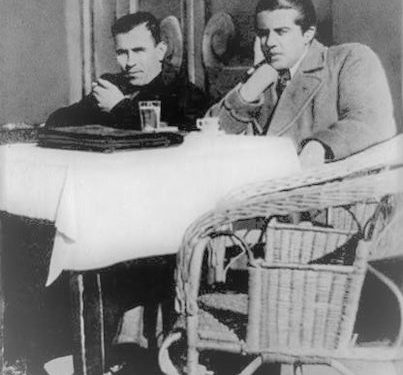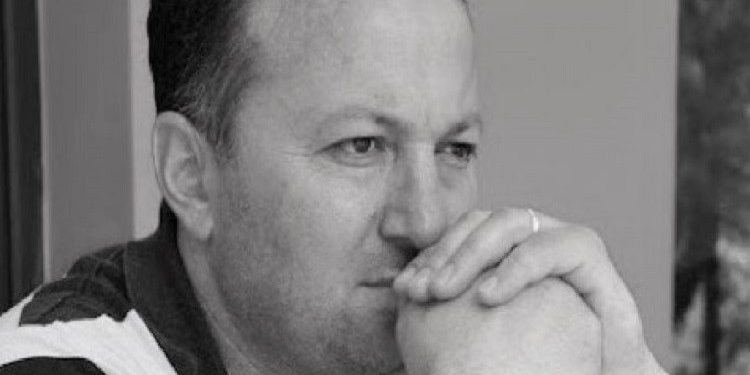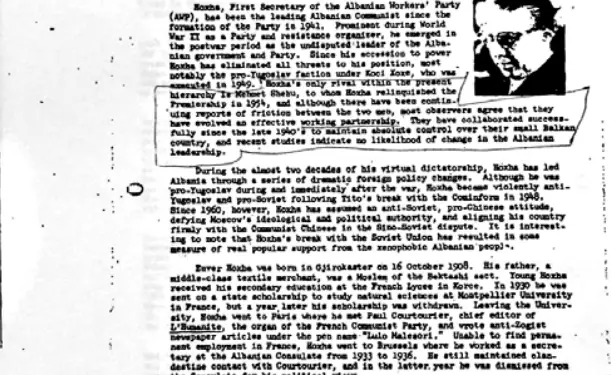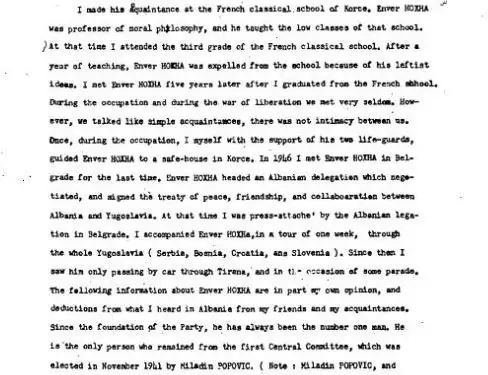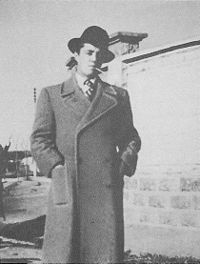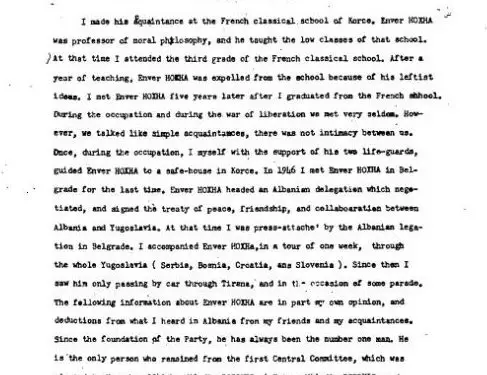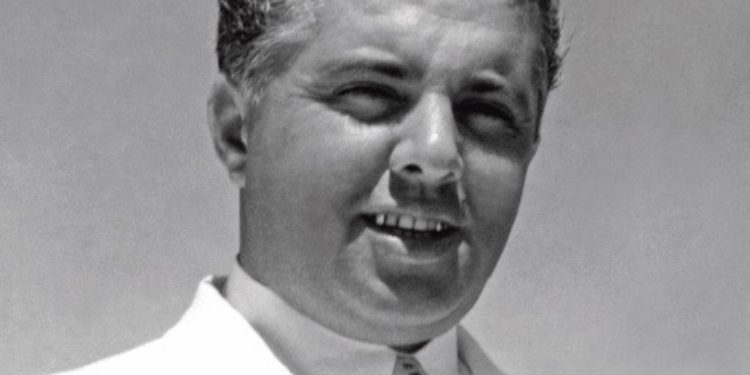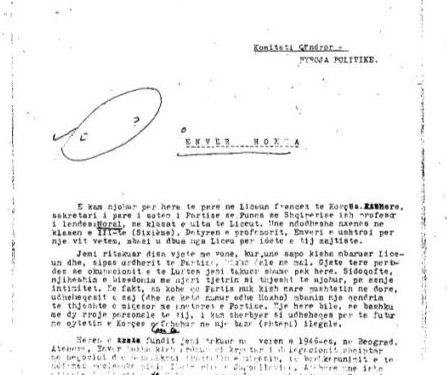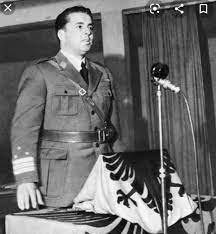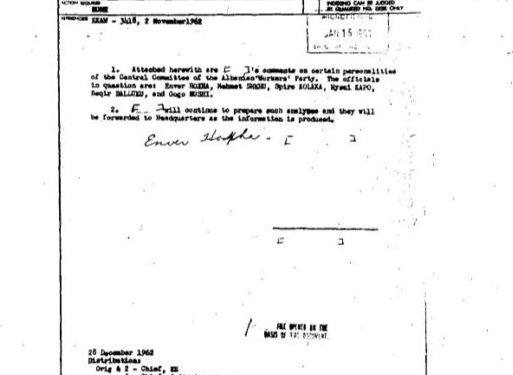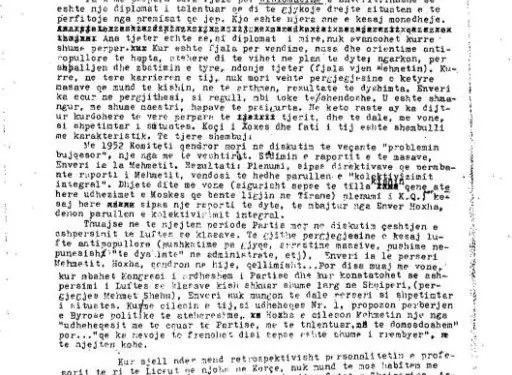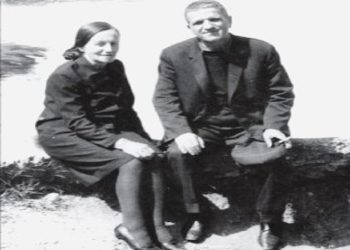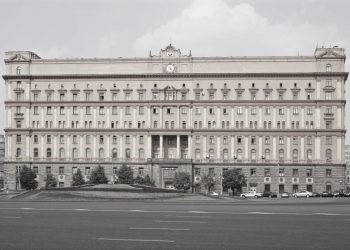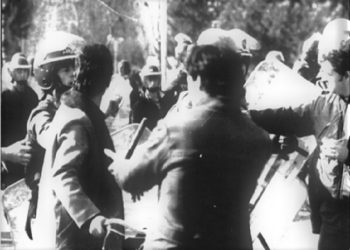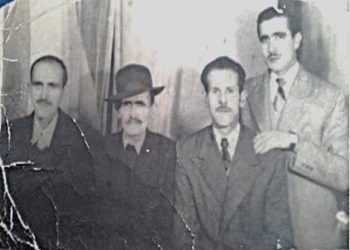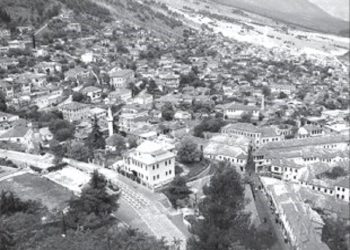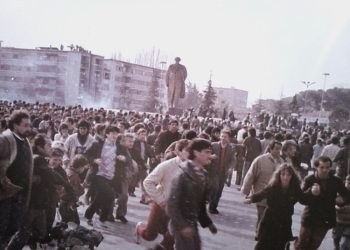By Ferdinand Dervish
Memorie.al / On November 2, 1962, somewhere in a refugee camp in Greece, the CIA, the world’s most powerful secret service, requested and administered a long and unusual piece of information about Enver Hoxha. In front of him was a companion of the Albanian dictator, Aleko Bimlin (name erased from the document, but forgotten in a single case), an Albanian from Korça who had the fortune, for a while, to have been Enver Hoxha’s companion. Aleko Bimli had known Enver Hoxha since he was a teacher at Korça High School.
Then, in 1946, working at the Albanian Legation in Belgrade, Bimli accompanied Enver Hoxha for a full week during his entire visit to Yugoslavia. Sometime later, under unknown circumstances, Aleko fled to Greece, where he was hunted by the CIA.
The information provided by Bimli reveals that he was an intelligent guy. The information he gave about Enver Hoxha is not only well written, but also reliable.
Likewise, the logical analysis of the facts seems correct and serious.
The information confirms the CIA’s interest in finding and collecting compromising data on Enver Hoxha, especially information about his sex life, girlfriends and eventual partners.
The information provided by Bimli starts with information about Enver Hoxha’s sexual life when he was a professor at Korça High School. Likewise, the document states that Hoxha did not part with women’s dresses even during the War.
In the information there are other very accurate data, especially about the power of Enver Hoxha, Mehmet Shehu and others.
Investments of secret services to obtain details about weak points of various leaders, especially opponents, are well known.
This is because publishing data proving extreme immorality or the like can have a better outcome than fighting with guns to strike down an opponent.
The document consists of 10 pages. The first four pages are in Albanian, while the following five pages are the English translation.
The last page has some notes and suggestions from the CIA agent who administered this data.
The secret CIA document on the unknown life of Enver Hoxha
I N F O R M A T I O N
SECRET
December 28, 1962
The comment of (…) to some members of the Central Committee of the Albanian Workers’ Party
1-Attached are the comments of (…) about some personalities of the Central Committee of the Workers’ Party of Albania. It is about the officials: Enver Hoxha, Mehmet Shehu, Spiro Koleka, Hysni Kapo, Beqir Balluku and Gogo Nushi.
2-(…) will continue to prepare such analyzes and they will be sent to the central office as soon as the information is ready.
Central Committee
POLITICAL BUREAU – ENVER HOXHA
I met him for the first time at the French High School in Korça. At that time, today’s First Secretary of the Labor Party was a professor of the subject “Morals”, in the lower classes of the Lyceum.
I was a student in the 3rd grade (Sixieme – six, ed.) Enveri held the position of professor for a single year, after he was expelled from the high school for his leftist ideas.
We met again a few years later, when I had just finished high school and, on the orders of the Party, had gone to the mountains. During the entire period of occupation and war, we met very few times.
However, we knew and talked to each other as mere acquaintances, without any intimacy. In fact, as long as the Party had not taken power, its leaders (including Hoxha) maintained a simple and friendly attitude towards the members of the Party.
Once, together with two of his personal guards, I served as a leader to bring him into the city of Korça, hidden in an illegal base (house). The last time we met was in the summer of 1946 in Belgrade.
Then Enver Hoxha had come as the head of the Albanian delegation that negotiated and signed the treaty of friendship, cooperation and mutual assistance between Albania and Yugoslavia.
Then I was a press attaché at the Albanian Legation in Belgrade. I accompanied Hoxha on a one-week tour throughout Yugoslavia (Serbia, Bosnia, Croatia and Slovenia).
It was the last time I had the chance to see him closely and talk to him. Since then I have only seen him from afar.
The opinions that follow on his person, therefore, are partly personal and partly deduced from what I have heard from former friends and comrades in Albania.
He has always stood above other leaders and this, since the founding of the Party. He is the only one left from the first Central Committee (elected by Miladin Popovici) since November 1941. Since then, you had your first post: that of political secretary. He kept it until today, overcoming all the crises.
Koçi i Xoxes, former organizational secretary of the Party until 1949, came to him only for a moment, but a very short one. Usually, and especially here in Greece, it is thought that Mehmet Shehu is more in control of the situation in Albania.
I am not of this opinion. I think that Enveri had the brakes even in the most critical moments for him (1948). My opinion is this:
Mehmet is his closest collaborator, his right hand. The real dictator was and remains Enveri. If Shehu is five heads above the other leaders, he does not rest, still, he is one head below Enver.
Enveri has always stood 6 heads above others. Mehmeti, from equal among equals (1949), made a vertical career and is today (1962) five heads higher. From time to time, in the free press, the judgment appears that Enver is not a man with a pulse, that he has a rather soft character and that he is influenced by someone else. I do not agree with this opinion either.
It has a pulse and character. Without a doubt, Mehmet is the wildest; his temperament, more prominent. These are essential merits for a leader in a totalitarian regime. However, here we should not forget the fact that, in addition to these merits, Mehmeti also has great flaws; he is capricious, capricious and always needs someone to contain him.
All the more because he takes his wishes for reality, because he is guided by personal passions, because he is carried away by momentary successes. Unlike Mehmeti, Enveri is more political, more diplomatic, more realistic.
His whole life shows that today’s First Secretary of the Central Committee is guided by the principle: “measure seven times and wait once”. Unlike Mehmet, who is sanguine, Enveri knows how to stretch his legs as wide as the bed.
Then he doesn’t lack courage or pulse. Enveri does not have the courage of a Capadai soldier (like Mehmet), but that of a talented diplomat who knows how to make concessions (unlike Mehmet, who is an intransigent extremist), when these are necessary, unavoidable.
Enver Hoxha has critical sense and common sense. He knows how to demonstrate at the same time that he has good sense even when he is extremely annoyed by someone.
Of all the leaders of the Party, Enveri enjoys the greatest sympathy of the mass of the Party. In this, of course, in addition to his relative merits, the so-called cult of personality, cultivated for years around his person, has also influenced. A little while ago I talked about Enver’s diplomacy.
I said that he is a talented diplomat who knows how to judge the situation correctly and take advantage of the premises he gives. This is one side of this coin. The flip side is that like a good diplomat, you never get too far ahead.
When it comes to decisions, measures and open anti-popular orientations, then it knows how to put it in the background; charges someone else (namely, Mehmet) for their announcement and implementation.
Never, in his entire career, did he take responsibility, as a rule, on sound ground. It has been avoided, with great skill, uncertain steps. In these cases, he always knew how to put others before others and come out later as the savior of the situation.
The chariot of Xoxes and his fate is the most characteristic example. Other examples: In 1952, the Central Committee took the “agricultural problem” into special discussion. Enveri left the study of the report of measures to Mehmet. Result: The plenum, according to the directives contained in Mehmet’s report, decided to throw out the slogan of “integral collectivization”.
Ten days later (certainly because such were the instructions of Moscow) the plenum of the Central Committee, this time according to a second report, held by Hoxha, condemns the slogan of integral collectivization.
Almost in the same period, the Party takes up the issue of intensifying the class struggle. All the responsibility of this anti-people’s war (shootings without trials, mass arrests, vacations of “suspicious” officials in the administration, etc.) Enver leaves again to Mehmet.
Hoxha stays in the shadows, deliberately… But a few months later, when the next Party Congress is held and when it is established that the intensification of the class war had gone too far (responsible for Mehmet Shehu), Enveri does not fail to come out again as the savior of the situation.
When with his capacity as leader no. 1, proposes the composition of the Political Bureau at that time, Hoxha describes Mehmet as one of the “most prominent leaders of the Party”, but… “Who needs to be restrained somehow because he is very carried away”.
When I think of the personality of the Liceu professor I knew in Korçë, I cannot help but be surprised by the fact that today this insignificant teacher directs the destinies of Albania. There was nothing special.
However, for the sake of the truth, I must admit that the insignificant person who was a professor in 1937-’38 in Korça, seemed completely different to me when I met him on the mountain as a partisan. He has personality. He has placed himself above the masses, he is a born demagogue. He is a good orator.
He knows better than anyone how to inspire the ordinary Party member…!
…Enveri has been doing the school of power for many years. And the truth is that he knew how to benefit from his experience, from his personal responsibilities, from exercising the power he was given.
Responsibilities magnify you in the eyes of others (of course, with the condition that you know how to cope with them successfully up to a certain point). This happened to Enver. Like every man, he has his flaws. Of course, these are hidden in Albania.
Personally, I think that among its shortcomings should be mentioned:
a) His megalomania. The cult of personality that has been built on him for years has blown his mind. The Enver of 1945 and without a doubt today is not the Enver of the time of occupation. Then in meetings with people he was more loving, more human.
Now, when he goes out for speeches, he is more robot than human, more theatrical than natural. It has its own opinion that it is the only one, not replaced.
b) Here in Greece I have heard that it is also…! As long as I was in Albania, I had never heard of something like this.
They even determine that H. Samarxhiu, a leather merchant who immigrated to Greece since 1943, in a good economic condition now in Thessaloniki, – had…his. Of course, personally, I can neither refute nor prove this accusation.
c) Marked weakness towards women.
How long he was a professor in Korça, he had the reputation of a Don Juan. His appearance also helped him in this. Even one of his “bequests” (girlfriends, ed.) – one of the most beautiful girls in Korça, is now married in Thessaloniki. Tanca Mishu (with the name of Tanca Manu).
He was known as a follower of dresses even during the occupation. From 1945 onwards, I heard nothing about his erotic adventures.
d) Absence of any feeling.
He always burned his closest collaborators. Outside of his career, outside of his political life, he didn’t count anything. Neither old friendships nor family ties were ever taken into account (he sent to his death his sister’s husband, Omar, one of the leaders of the ‘National Front’, in whose house he had stayed to hide during the operation as illegal; Koçin of Xoxes, and all his former friends.
“State needs” and “personal ambitions” have always been above sentiments. He showed ferocity, which in most cases was not necessary. He has always preferred extremist, radical solutions. And he knew how to present all this as Pont Pilate.
Commentary on the translation
Comment: Speaking about Enver Hoxha’s political closeness, Aleko came up with a funny conclusion. He wonders how that young professor already guides the destinies of the country.
In my opinion, there are two people whom I know personally, who can tell us details about the immorality and other aspects of Enver Hoxha’s life.
They are:
Ramazan Qosja, born in Tirana around 1920, unmarried, with one child, emigrated from this country in 1956; currently living in New York City (I don’t know the address). Ramazan Qosja was a money changer, and he knows Enver Hoxha very well.
Loro Brahimi, approximately 60 years old. In 1946 or 1947, Loro Brahimi was a personal bodyguard of Enver Hoxha, during his visit to Paris.
In 1948, Loro Brahimi returned to Albania and in 1949 he escaped from Albania to Yugoslavia, then to Italy.
Loro Brahimi currently lives with his family in Paris. He knows everything about Enver Hoxha. Memorie.al




